The Top 50 Guitar Riffs Of All Time: 50-26
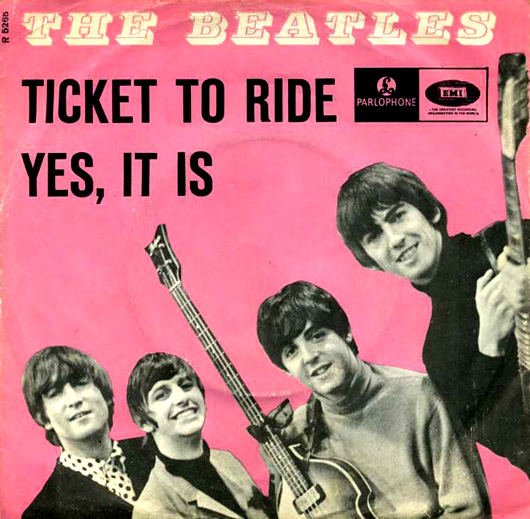
Ticket To Ride
So what the hell is a riff anyway? There are numerous definitions out there, but most are along these lines: “a short rhythmic musical phrase which may be repeated often during a piece.”
Through the decades as folk begat blues, blues got rhythm then spawned rock ‘n’ roll and its many bastard offspring, the guitar riff became king, sometimes even usurping the vocal melody as a song’s main calling card.
Whole careers have been built on killer guitar riffs, so it’s fitting that as another decade winds down we here at MusicRadar celebrate the most unforgettable air guitar anthems of all time.
And you voted in your droves in response to our Ask MusicRadar search for the Top Guitar Riff Of All Time. So here’s part one of the Top 50, part two featuring numbers 25-1 is now live here. But who better to kick off our countdown than the biggest pop group in history…
Ticket To Ride was recorded in February 1965 and is astonishing for its time. Huge drums and droning A notes frame George Harrison’s chiming arpeggiated riff, further cementing the Rickenbacker 12-string in the sonic vocabulary of the sixties and – in combination with Lennon’s newfound lyrical weight – paving the way for folk rock.
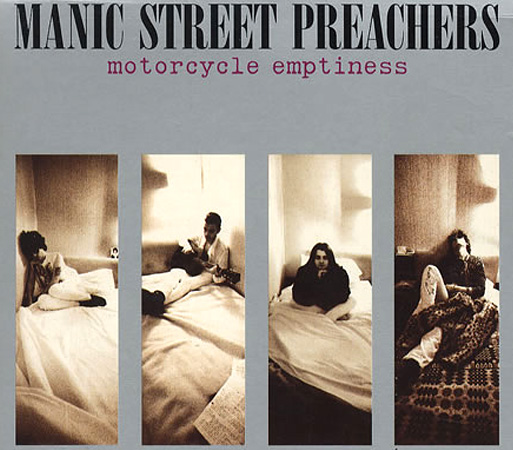
Motorcycle Emptiness
When is a guitar riff not a riff, but actually a melody or a lead line? This cut from Manic Street Preachers’ 1992 debut LP Generation Terrorists blurs all of the boundaries but showcases the lead talents of James Dean Bradfield; surely one of the finest British guitarists of his generation.
JDB’s Slash-influenced Les Paul neck pickup wailing is abundant in this, the first sign that the Manics were not just eyeliner-smeared sloganeers but potential stadium-fillers too.
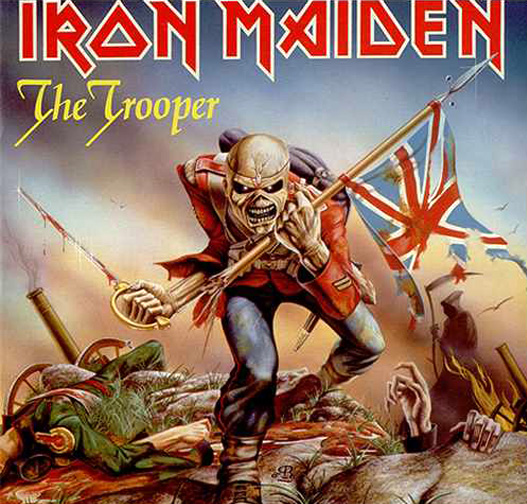
The Trooper
Quintessential Maiden this. Smith and Murray's intricate harmony guitars combine with galloping rhythms evocative of songwriter/bassist Steve Harris’ muse: Tennyson’s The Charge Of The Light Brigade.
Why you love it:
“One of the greatest bands for producing timeless riffs ever. Also the band that got me enthusiastic about guitar in the first place.” (Thanks, dj_host)
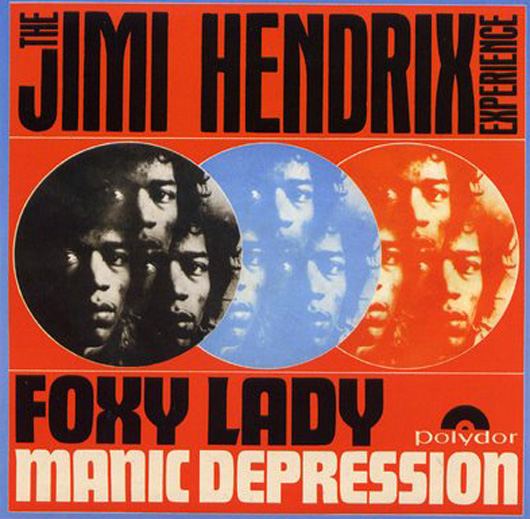
Foxy Lady
For all of his guitar virtuosity and studio explorations, nobody made effortlessly cool, raunchy pop singles in the late 1960s quite like James Marshall Hendrix. This is one of his best, propelled by one of the best rhythm sections in history.
Trivia fans note: the song’s title was misspelt ‘Foxey Lady’ on the North American version of Are You Experienced and many stateside fans still refer to it as such today.

Under The Bridge
Anyone who has worked in a guitar shop since its release as a single in 1992 is likely justifiably sick of Under The Bridge. John Fruciante’s arpeggiated intro long ago entered the canon of great guitar parts doomed to be recycled ad nauseum by budding players along with the likes of Enter Sandman and (god forbid) Stairway To Heaven.
For Frusciante’s inspiration for the band’s biggest hit, look no further than Bold As Love-era Hendrix. The embellished clean parts throughout are pure Jimi.
As for Red Hot Chili Peppers singer Anthony Kiedis’ inspiration? “I'd had this beautiful angel of a girl who was willing to give me all of her love, and instead of embracing that, I was downtown with fucking gangsters shooting speedballs under a bridge."
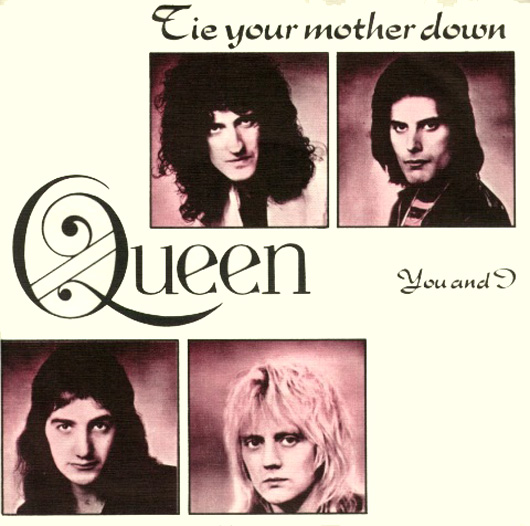
Tie Your Mother Down
The stomping opener from Queen’s 1976 LP A Day At The Races was actually composed by Brian May on a classical guitar, but the grimy Rory Gallagher-influenced riff rocks as hard as anything Queen ever recorded.
Unsurprisingly, it became a live favourite and featured on every subsequent Queen tour.
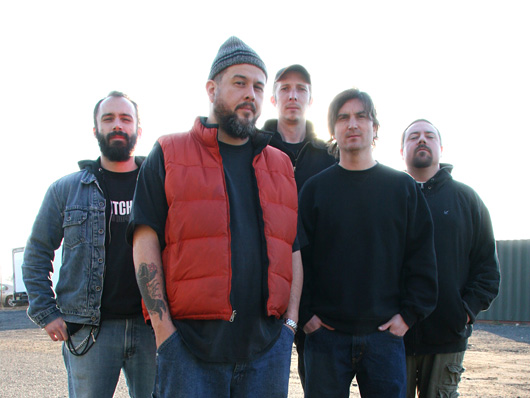
Profits Of Doom
Clutch may be one of the least famous bands in this list but fans will testify to the fact that the cult Maryland rockers know their way around a killer riff. Profits Of Doom is just one fantastically groovy example of their prowess.
Backstage at Download 2009, Total Guitar magazine caught Clutch frontman Neil Fallon on camera and he shared some of his considerable riff-writing wealth. Check out the exclusive video here.
Why you love it:
"This may not be such a well known riff, but look up Profits Of Doom by Clutch on YouTube and I defy you not to bounce like loon at the grooviness of it." (Thanks, getoffmeyoufilthysofa)
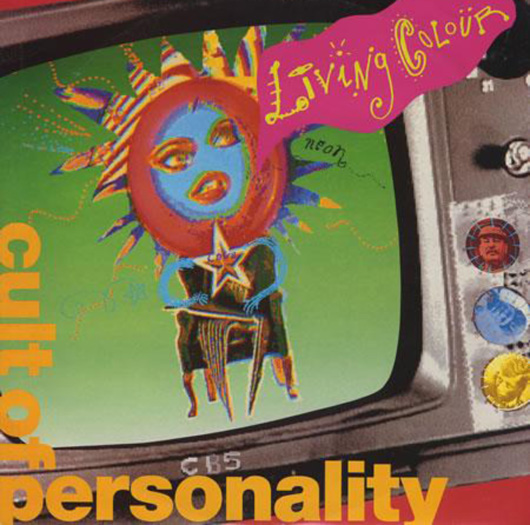
Cult Of Personality
Living Colour’s 1988 debut single was propelled by Vernon Reid’s Zeppelin-influenced riff and went on to win MTV VMA and Grammy awards, acting as a springboard for the funk-rockers’ 1990s career.
In 2007, it was re-recorded for the Guitar Hero III video game as the original master tapes had gone missing.
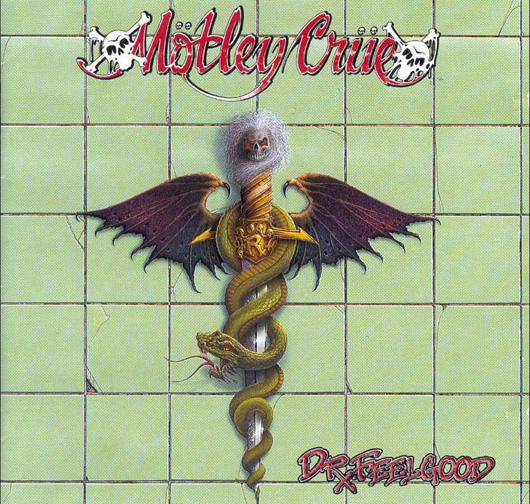
Dr Feelgood
Anyone who has read The Dirt will probably agree that Mötley Crüe have few rivals when it comes to sleaze and controversy. Unsurprisingly, this groovy title track from their fifth album is an ode to a Hollywood drug dealer.
Why you love it:
"Just wanted to make sure we don't forget Mötley Crüe's addicting and great-to-play riffs." (Thanks, pleskoch)
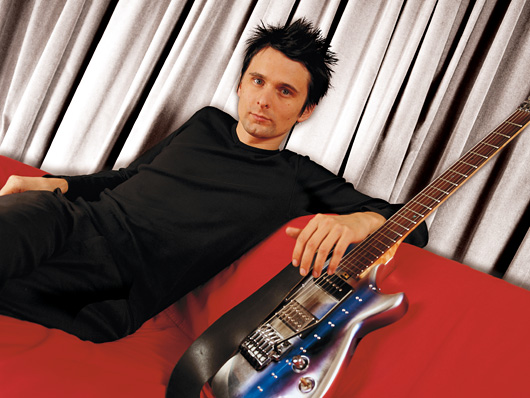
New Born
Plug In Baby might have been the big single from Muse’s 2001 LP Origin Of Symmetry, but New Born was the song that showed Matt Bellamy could punch in the heavyweight riff division.
The cacophonous fuzz that enters at 1:25 becomes pulverising once the rhythm section kicks in behind it. If Bellamy’s contemporaries weren’t jealous already, they certainly were now.
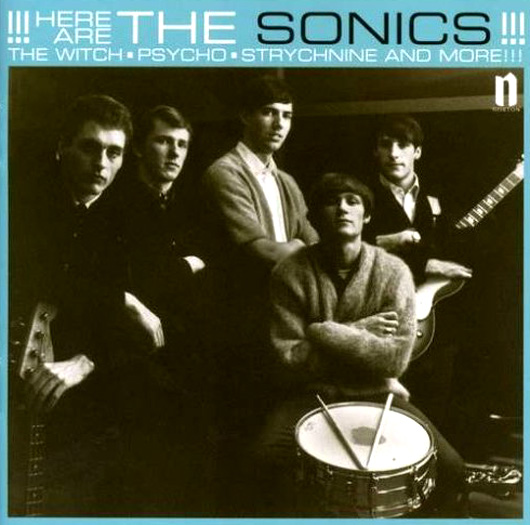
Have Love, Will Travel
Back in 1959, a little-known track was released by the name of Have Love, Will Travel. Centred around a doo-wop style vocal riff, it didn't do much for its writer initially.
Six years later, Washington State garage rockers The Sonics reinvented the song with a fuzzy, rocking treatment that took its (ahem) sonic cues from The Kinks' raucous early singles.
As for the original artist? Richard Berry chalked it up to experience. Back in '55, he'd had similar 'failure' with another song he'd written called Louie, Louie...
Following in the wake of The Sonics, there have been numerous covers of Have Love, Will Travel over the years. For our money, this version by The Black Keys is the most convincing.
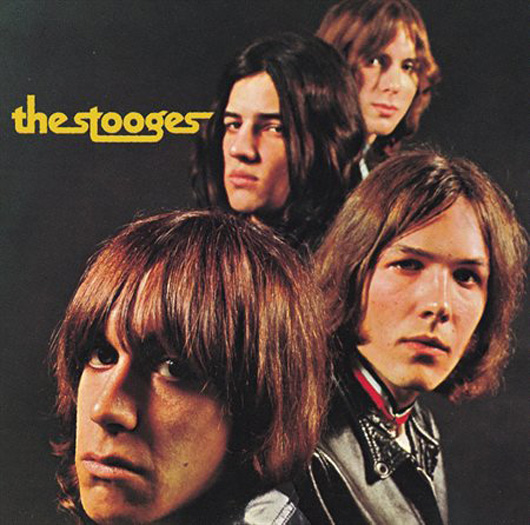
I Wanna Be Your Dog
If there's a year zero for punk rock, then it's probably 1969, not 1976. The Stooges' self-titled debut from that year is bursting with the distortion, dissonance and danger at the heart of punk and I Wanna Be Your Dog is the standout.
Few songs in the history of rock 'n' roll have managed to be so volatile, so incendiary and so brilliantly dirty all at the same time.
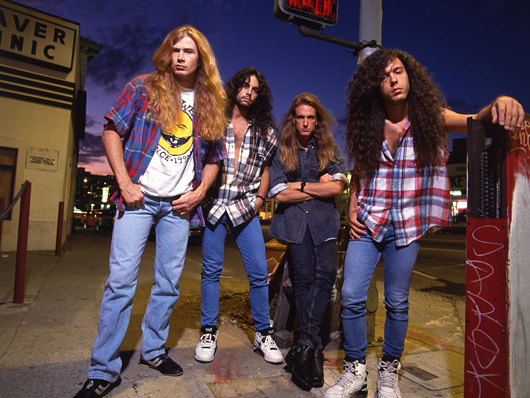
Symphony Of Destruction
One of Megadeth's most accessible, least overtly 'metal' moments, this 1993 single still features a menacing, brooding metal riff that is one of Dave Mustaine's simplest and best.
Mustaine on Symphony: "It's about the masses being led to their own destruction by a leader who's more or less a puppet of a phantom government. Just about every leader we've had that hasn't ended up with a bullet in his head is a political puppet." Cheery stuff.
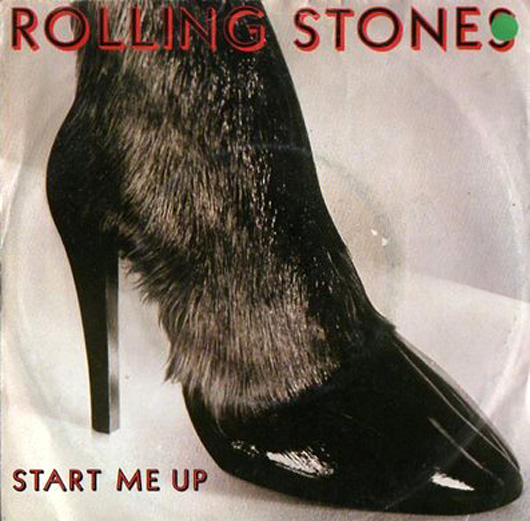
Start Me Up
For many rock critics, The Rolling Stones had peaked by 1972 with the release of Exile On Main St. Their gradual transformation from band to brand through the late 1970s into the 1980s resulted in few new studio recordings of merit.
However, critical wisdom aside, there were certainly still hits in the tank, as this slice of genius from 1981 proves. Start Me Up may have been knocking around since 1975 but on its release, that trademark Keith Richards intro riff made it an instant classic.
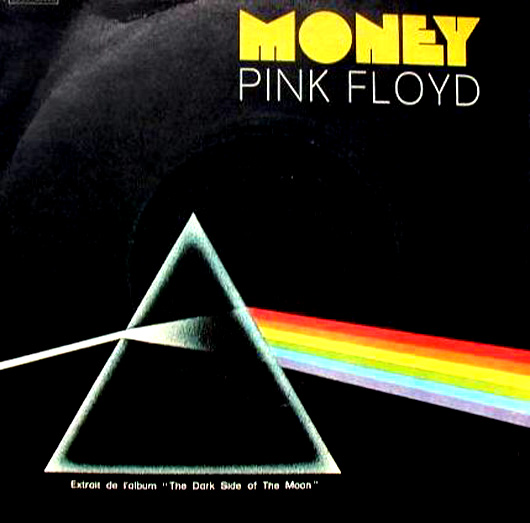
Money
Not many riffs in this Top 50 deviate from rock 'n' roll's standard 4/4. However Roger Waters' 7/4 bass riff in Money - accented by sound effects and David Gilmour's sparse, wiry guitar - may be weird and unconventional on paper, yet it sounds like a perfectly natural groove on record.
This is thanks in no small part to the abilities of a group of extremely skilled musicians. But we do have to point out, again, that Money is built around a bass riff. A bass riff. And this is a run-down of the top 50 guitar riffs of all time.
On the other hand, loads of you did vote for it so we'll let you get away with it.
Just this once.
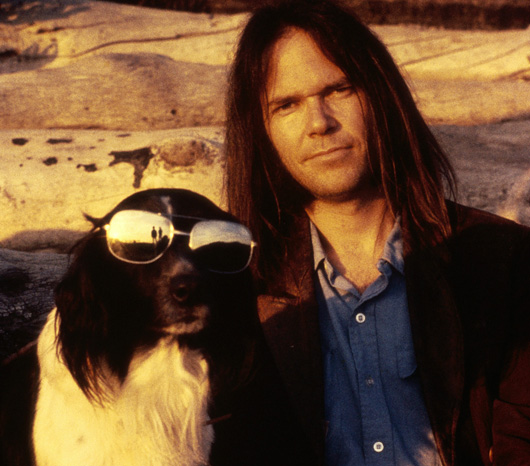
Hey Hey, My My (Into The Black)
"It's better burn out than to fade away…" Now forever linked with grunge after being quoted in Kurt Cobain's 1994 suicide note, this Neil Young song is actually about what the singer perceived to be his own growing irrelevance against the backdrop of late 1970s punk.
The message is simple: evolve or stagnate - and over the years Young has retained enough fire to continue to do the former. In the song's electric and acoustic incarnations, both sides of Young's musical persona are showcased: the noisy rocker (as evidenced by its appearance in this Top 50) and here, in My My, Hey Hey (Out Of The Blue), the tender balladeer.
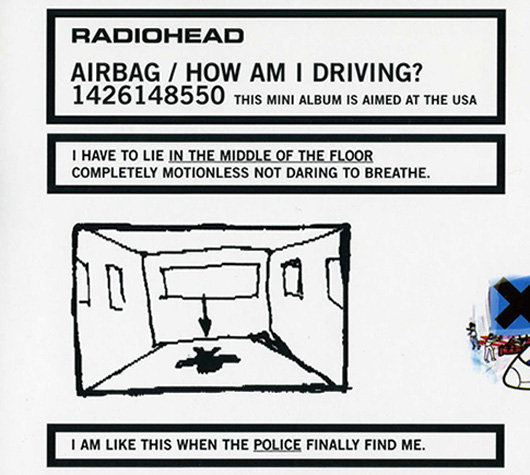
Airbag
Fair enough, this opening salvo from 1997's OK Computer is an absolute belter, but we were still surprised to see Airbag get so many votes at the expense of such other riff-loaded classics Radiohead as Just or Paranoid Android.
However, listening to Jonny Greenwood's single-string riff saw its way across cut-up beats, chiming chords and ambient noises, even today Airbag still sounds like an exhilarating postcard from a skewed and chilling not-too-distant future.
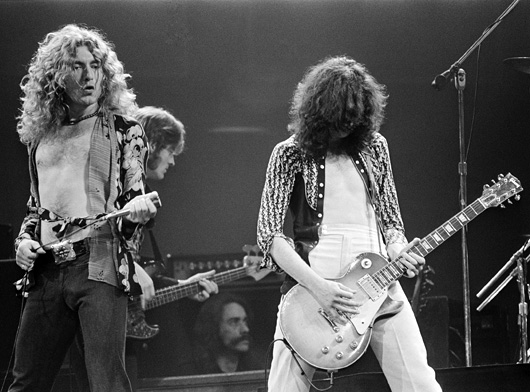
The Ocean
Another of the few entries in this Top 50 to break with 4/4, The Ocean (from Led Zeppelin's 1973 Houses Of The Holy LP) features an intro riff in alternating bars of 4/4 and 7/8, which famously took much perfecting in the studio.
We've always thought that Back In Black sounds pretty similar, but it's probably too tenuous for Mr Page to call in the lawyers. And it won't come as much of a surprise to find out that a few more of Led Zep's monster riffs are set to feature in our/your Top 50…
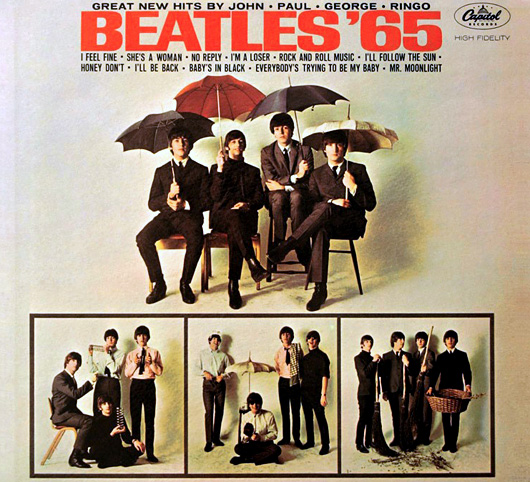
I Feel Fine
The second Beatles riff in the Top 50 so far, when writing about I Feel Fine critics usually devote more attention to the feedback - the first instance of its recorded use in pop - that precedes the intro riff than the riff or the song itself.
Recorded on 18 October 1964, Lennon is supposed to have penned the part under the heavy influence of Bobby Parker's Watch Your Step, a 1961 release covered by The Beatles before their rise to fame.
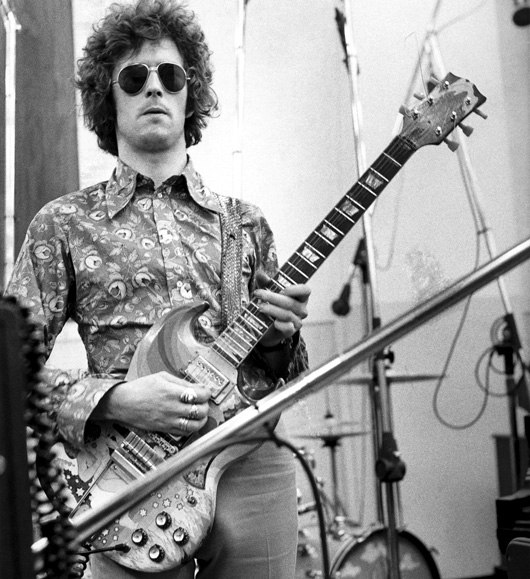
Sunshine Of Your Love
This awesome bass/guitar riff was written by Jack Bruce on his upright bass in January 1967 after Bruce and Clapton had attended a Jimi Hendrix Experience live show earlier that evening.
Sunshine Of Your Love would become Cream's biggest hit, and Hendrix himself went on to cover it at numerous concerts. Here's an acoustic version performed by Clapton years later.

Walk
And now for something a little heavier - we give you the late, great Dimebag Darrell Abbott and his Pantera bandmates at their finest.
It's easy to forget just how abrasive Pantera sounded when Vulgar Display Of Power came out in 1992. There aren't many riffs here with fewer notes, but the feel is absolutely everything.
Why you love it:
"You don't need to over complicate things to write a brilliant, catchy riff. Two notes and a bend = Walk by Pantera." (Thanks, RobDavies)
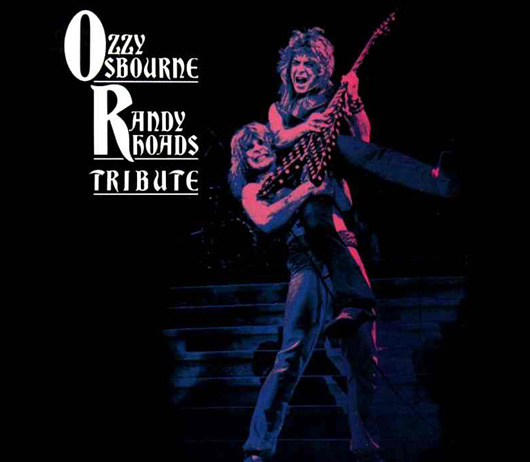
Crazy Train
Ozzy Osbourne's first single as a solo artist on leaving Black Sabbath, 1980's Crazy Train is an amazing showcase for the blazing lead skills of Randy Rhoads but it's that menacing intro riff that really digs its hooks in.
The live version released on Osbourne's Tribute album five years after Rhoads' untimely death was released as a single in 1987.

Killing In The Name
From its punchy intro riff to the Drop D groove that underpins Zack de la Rocha's barbed polemical rhymes, Rage Against The Machine's 1992 debut single still ranks as one of the finest, and fieriest in rock history.
How did it come about? Tom Morello explains: "I actually wrote it while teaching a guy how to do Drop D tuning, and in showing him how to play with that tuning I just played that riff. I stopped the guitar lesson and I got out my little recorder and I said, 'I'm gonna try to remember this one!'"

Welcome To The Jungle
As debut albums go, Appetite For Destruction is about as good as it gets. And in terms of a statement of intent, opener Welcome To The Jungle is a sexual petrol bomb loaded with Hollywood sleaze.
With much of the music penned by Slash, the delay-laden intro and snake-hipped main riff in 'Jungle are two highlights of four and a half minutes of hard rock that, more than two decades on, are so familiar it's almost impossible to be objective. Truly, GN'R at their lean, nasty best.
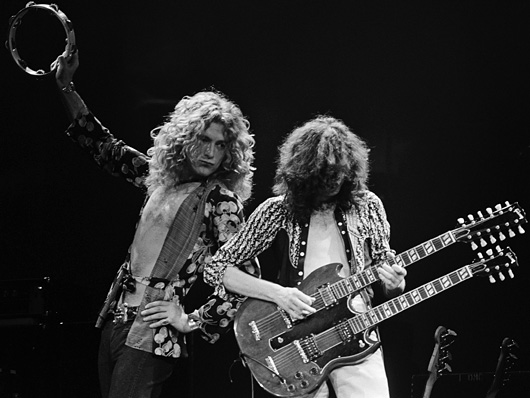
Rock And Roll
Sometimes the simplest ideas are the best, and few songs are simpler in the Led Zeppelin catalogue than Rock And Roll.
Their live set opener between 1972-5, Rock And Roll was the product of a studio jam and one of the few Zeppelin tracks where all four band members share writing credits.
On Thursday 26 November, MusicRadar revealed the second half of the Top 50 Guitar Riffs Of All Time, as voted for by you. What will be number one? You'll have to click here to find out...
MusicRadar is the internet's most popular website for music-makers of all kinds, be they guitarists, drummers, keyboard players, DJs or producers.
GEAR: We help musicians find the best gear with top-ranking gear round-ups and high-quality, authoritative reviews by a wide team of highly experienced experts.
TIPS: We also provide tuition, from bite-sized tips to advanced work-outs and guidance from recognised musicians and stars.
STARS: We talk to artists and musicians about their creative processes, digging deep into the nuts and bolts of their gear and technique. We give fans an insight into the actual craft of music-making that no other music website can.

